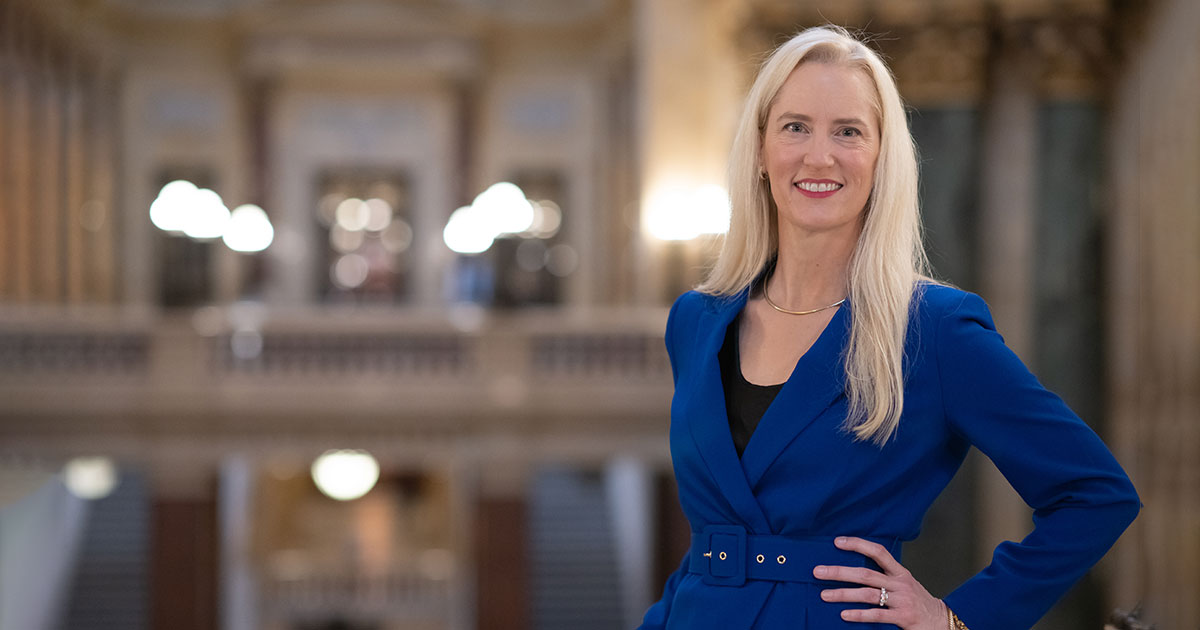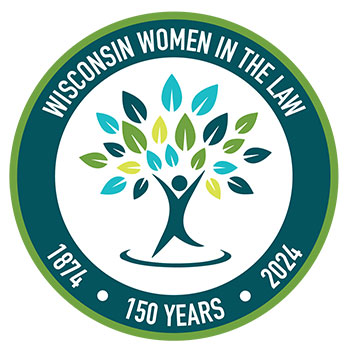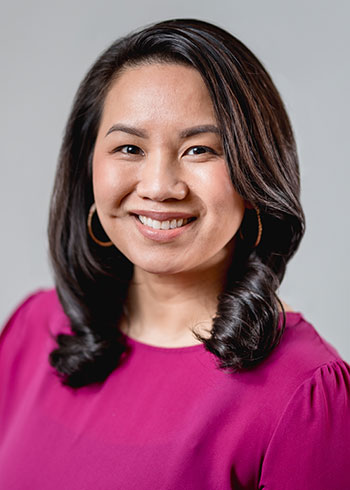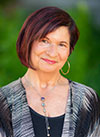
Gwendolyn Lindsay Cooley. Photo: Tatiana Shirasaki/Tati Photo
Gwendolyn Lindsay Cooley decided to become a lawyer after working as an aide to U.S. Senator Herb Kohl in Washington, D.C.
Cooley spent two years in Washington, traversing the U.S. Capitol and assisting Kohl in committee meetings. She noticed that staff members with law degrees seemed to have an advantage.
“They were able to make a difference in a way that those with only a bachelor’s degree could not,” Cooley said. “They were really able to affect policy and make change.”
So, Cooley left the political arena for the classroom.
“In law school I realized how much fun litigation was,” Cooley said. “I’ve never looked back.”
That’s an understatement. Since 2005, Cooley, who obtained her law degree from Marquette University Law School in 2004, has represented the state of Wisconsin in numerous nationwide antitrust cases. She was the lead attorney in
Wisconsin v. Indivior, coordinating attorneys general from 42 states in a lawsuit against the manufacturer of Suboxone, a heroin treatment drug.
Cooley serves as the chair of the National Association of Attorneys General Multistate Antitrust Task Force. She also served as the co-chair of the task force’s Pharmaceutical Industry Working Group and leads the Reimagining Pharma Attorney Generals Advisory Group.
Head East, Young Woman
Cooley grew up in the Wausau area. During college, she worked on a campaign for David Obey, the Democrat who for 42 years represented northern Wisconsin in the U.S. House of Representatives.
 Jeff M. Brown, Willamette Univ. School of Law 1997, is a legal writer for the State Bar of Wisconsin, Madison. He can be reached by email or by phone at (608) 250-6126.
Jeff M. Brown, Willamette Univ. School of Law 1997, is a legal writer for the State Bar of Wisconsin, Madison. He can be reached by email or by phone at (608) 250-6126.
That experience led to Cooley’s job with Senator Kohl.
Cooley had a 90-second phone interview with Kohl’s office in D.C. That was all it took.
“I interviewed on Wednesday, and I started in Washington the following Monday,” Cooley said.
Cooley spent two years working for Senator Kohl at the U.S. Capitol. It was a formative experience, in part because it piqued her interest in antitrust law.
Kohl served on the Judiciary Committee’s antitrust subcommittee. Cooley didn’t assist Kohl on that committee, but her tenure with Kohl’s office during the time he was chair of the antitrust subcommittee came to the attention of Wisconsin Attorney General Peg Lautenschlager, whose campaign Cooley worked on during law school.
‘It’s Wonderfully Hard’
After Cooley graduated from Marquette, Lautenschlager hired her at the Wisconsin Department of Justice to handle antitrust and environmental law.
Cooley figured she’d be doing more environmental law than antitrust law. She was wrong.
“I thought that antitrust was so fascinating because it’s so intellectually rigorous and the law is so incredibly complicated,” Cooley said. “It’s all common law, it’s always changing, the state antitrust statute is such an old statute, and it’s so general.”
“Plus, you get to examine in great detail different industries,” Cooley said. “It’s wonderfully hard. I fell in love with it in 2005 and I’ve never looked back.”
Many antitrust lawsuits are filed by the federal Department of Justice. But the states – 10 of which enacted antitrust laws before the enactment in 1890 of the federal Sherman Anti-Trust Act – play a big role in antitrust enforcement, Cooley said.
“The states have always recognized that there’s an advantage to us proceeding together,” Cooley said. “Typically, the types of companies that we’re concerned about have touch points in many states and now, touch points internationally. So, we have relationships with our sister states, federal enforcers, and international enforcers.”
Making History: Celebrating 150 Years of Women in the Law
 Lavinia Goodell’s epic battle to open the practice of law to women paved the way to a more inclusive profession and greater access to justice for underserved individuals and communities.
Lavinia Goodell’s epic battle to open the practice of law to women paved the way to a more inclusive profession and greater access to justice for underserved individuals and communities.
Join Wisconsin’s legal community this year in celebrating the significant contributions of women in the law.
June 17: Commemoration of Lavinia Goodell’s Admission to the Bar, 5 p.m., Rock County Courthouse, reception to follow.
June 21: Five Important Legal Developments Affecting Women and the Women Lawyers Who Advanced Them, 3:15 p.m., State Bar Annual Meeting & Conference, Green Bay.
Questions? Contact Mary E. Burke at
WisWomenLaw150@gmail.com.
Lead Lawyer
Wisconsin v. Indivior Inc. (In re Suboxone Antitrust Litigation), No. 16-cv-5073 (E.D. Pa.), filed in 2016, is a case in point.
The federal lawsuit, which Cooley led, alleged that manufacturers of Suboxone, a heroin treatment drug, illegally schemed to prevent competitors from bringing a generic version of the drug to market.
“I led that case for eight years,” Cooley said. “We sued them in the eastern district of Pennsylvania and then last year settled for $102.5 million.”
Bringing the Indivior lawsuit to a successful conclusion has been the highlight of Cooley’s career to date.
“It was a group effort, but I was coordinating 42 states,” Cooley said. “I was able to keep all 42 in the litigation and actively participating and shepherd us through defenses to motions to dismiss and motions for summary judgment.
“We were in the run-up [to] trial when we finally settled,” Cooley said. “I’m so proud of the way we worked together. My colleagues still say that that was the most well-executed case that they’ve ever seen, which is remarkable because you’d think that after eight years there’d be a lot of pressure to get rid of that case.
“It was such an honor to lead that group and so wonderful to get everyone working together for this really important purpose,” Cooley said. “Heroin and opioid addiction are a huge problem, so making sure that people have low-cost alternatives to get the treatment that they need is fundamentally what public service is about.”
Leading the case gave Cooley the opportunity to affect a major policy change, just like she’d seen those staffers with law degrees doing on Capitol Hill.
“It was because Wisconsin was so disproportionately affected that I was able to convince the attorney general at the time to let me lead the case, because it’s such an important issue and we want to make sure that people have access to these drugs and that they’re not being cynically manipulated by the drug companies,” Cooley said.
In addition to writing and arguing motions, Cooley handled all the logistical and administrative tasks required by the lawsuit. Those tasks included getting attorneys new to the case up to speed and managing the transition from Attorney General Brad Schimel to Attorney General Josh Kaul, who unseated Schimel in 2018.
“With staff turnover over eight years, there weren’t many people who could hold the thread through the whole case,” Cooley said. “That was why my tenure was so important – I knew what somebody had said in a deposition seven years ago about a certain thing.”
‘Just Say “Yes”’
Cooley’s advice to new women lawyers is to grab every opportunity they’re offered.
“Just say yes,” Cooley said. “Opportunities abound for people who are willing to put in the work. I’ve found that there’s something to learn from every experience, even if it’s learning what not to do. You can fit in a lot more than you think you can.”
It’s a piece of advice informed by Cooley’s experience working as an intern for Wisconsin Supreme Court Chief Justice Shirley Abrahamson.
“Her work ethic was tremendous,” Cooley said. “She used to tell us interns, ‘I’ll sleep when I’m dead.’”
Cooley cites Abrahamson and Lautenschlager as the two women lawyers who’ve had the biggest influence on her career.
“That level of thinking thoughtfully about how you do justice and then thinking about the importance of putting in the work … those two were hugely influential,” Cooley said. “Peg Lautenschlager really believed in public service and in using your public service to do justice. She was fantastic at that.”
Still a Distance to Go
Cooley said women lawyers continue to face challenges.
“We’re still paid less than male lawyers, and that’s unfair,” Cooley said.
She also said that women lawyers are too often judged solely on their identities.
“The newspaper accounts of Lavinia Goodell’s first and only trial discuss how she was bright and witty,” Cooley said. “More importantly, she won. My hope for the future of women and all people in the legal profession is that we’re judged more by our contributions to the profession and to society and less by our identities.
“I think we’ve come a long way since Ms. Goodell but we’re not there yet.”
Women to Watch | MaiVue Xiong: Family Tragedy Inspires Community Leadership
MaiVue Xiong’s change in career from biology to law was fueled by an unexpected turn of events for her family. It is in the law that she finds her passion for greater community impact.
By Joyce Hastings

When MaiVou Xiong was in her junior year at U.W.-Madison, majoring in biology, her world turned upside down.
“My parents owned and ran a small Asian grocery store in my hometown of Eau Claire. On a cold February evening, my mother was closing the shop alone when three men entered the store,” she recounts.
As Xiong’s mother made her way to the safe in the back room, she was shot three times. “The men ran to the store front, tore out the cash register, and took off. They left her to die. Thankfully, she survived,” explains Xiong.
“Suddenly, I found myself driving up and down I-94 every weekend to come home. There was so much to deal with in the aftermath of the shooting.
“When the men were caught and charged, we finally had hope, a way to channel our anger, frustration, and sadness. It gave us a sense of relief as we sought justice.”
A Change of Plans
Born in a refugee camp in Thailand, Xiong immigrated with her parents to the United States at the age of one. “The shooting was my first introduction to the court system, and, thankfully, it was a positive one,” says Xiong.
This experience shifted Xiong’s goals in law school. “I went to law school thinking I’d be a litigator, that I would help others get their justice,” says Xiong. “But when I returned to Eau Claire in 2010, I naturally gravitated toward business and real estate law. It took me back to my roots growing up with an entrepreneurial-minded father.”
“Building my business practice was harder than the practice of law itself,” comments Xiong.
“I had some great mentors who helped me navigate the many challenges I faced as a minority woman in this predominantly white town.
“I worked twice as hard to earn the trust of my clients and their repeat business. I sacrificed family time so I could normalize my image as someone who can be a big company’s business lawyer.”
Xiong made partner with Weld Riley S.C. within five years and then practiced for another five years as a shareholder. “But I felt a strong calling to fuel my passion for helping the greater community – not just those who can afford my legal fees,” says Xiong.
The Perfect Combination
Xiong now serves as the executive director of the Pablo Foundation. “This work combines my legal skills with my life experiences and community connections for greater community impact.
“The foundation financially supports other charitable organizations in the areas of health, housing, education, and the arts,” says Xiong. “Through our partners, and the grants we administer, we work to inclusively transform Eau Claire.
“I get to work with some of the most creative and philanthropic people in our community in reenvisioning how we can create the most impact for as many people from varying backgrounds.”
Taking that Leap
Xiong advises leading from the heart when feeling an inner tug to take a new career direction. “Do what feels right, not what others think or expect of you. Life and career paths are not linear. When you feel a shift, listen closely, and if it feels right, take that leap.
“I really struggled with leaving the corporate practice that I worked so hard for and entering the unknown. I soon found out there’s so much more on the other side.”
“I’m so glad that I took that leap,” she says. “I get to impact the community at a much bigger level. And, I keep my foot in the business world as of counsel for Bakke Norman S.C.”
Xiong hopes to break down the barriers she faced in her career, making it easier for those who come after her to reach their dreams. “It is also my hope that our young lawyers will step up to help those who come after them.”
 Joyce Hastings is a former communications director for the State Bar of Wisconsin. She, along with a consortium of women lawyers, are planning a variety of activities to celebrate the 150th anniversary of Wisconsin women in the law in 2024.
Joyce Hastings is a former communications director for the State Bar of Wisconsin. She, along with a consortium of women lawyers, are planning a variety of activities to celebrate the 150th anniversary of Wisconsin women in the law in 2024.
» Cite this article:
97 Wis. Law. 37-40 (April 2024).
